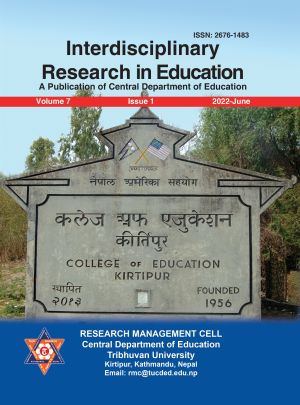Classroom Assessment Practice of Higher Education: A Case of Tribhuvan University
DOI:
https://doi.org/10.3126/ire.v7i1.47497Keywords:
Classroom Assessment , Self-Assessment , Connectivity , ScaffoldingAbstract
Classroom assessment is for the improvement of a learner’s diverse ability, teachers teaching strategies as well as improvement of entire educating system of institutions. This qualitative phenomenological study focused on the critical analysis of the classroom assessment practices with reference to 21st century learners’ competencies and assessment techniques.The data were collected from 12 faculty members of Department of Mathematics Education, Central Department of Education, Tribhuvan University. Interview schedule and participant observation were the main tools for data collection. The data were analyzed inductively in reference to the theory of scaffolding based on ZPD (Vygotsky, 1978) based on different purposes of assessment; Assessment of, assessment for and assessment as learning. It was found that among the three purposes of assessment, assessment of learning was the dominant practice which ultimately marginalized the other two. This finding points to the need of assessment as learning and assessment for learning rather than assessment of learning, which is also exclusively focused on 21st century learning competencies.
Downloads
Downloads
Published
How to Cite
Issue
Section
License
This license enables reusers to distribute, remix, adapt, and build upon the material in any medium or format for noncommercial purposes only, and only so long as attribution is given to the creator.




